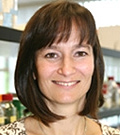Veronique Baron, Ph.D.

Assistant Professor, Vaccine Research Institute of San Diego
Ph.D. University of Nice-Sofia Antipolis, 1991
H.D.R. Faculty of Medicine, Nice, 1996
Postdoctoral training: INSERM U145, France
Sabbatical: Martin Schwartz Laboratory, The Scripps Research Institute, 1998-1999
Research Interests:
Cell proliferation in cancer is triggered by genetic alterations that activate oncogenes or inactivate tumor suppressors. Our laboratory currently focuses its efforts on the study of Egr-1 (Early Growth Response-1), a transcription factor that regulates genes implicated in the growth and survival of cancer cells and that acts as an oncogene or as a tumor suppressor depending on the circumstances.
We have been particularly involved in testing the hypothesis, backed by recent evidence from independent laboratories, that Egr-1 promotes the progression of prostate cancer, a prevalent malignancy among men in the United-States. The progression of the disease follows multiple defined steps, from benign hyperplasia to hormone-independent metastatic disease. Current therapies are limited and discovery of a successful treatment is still an important challenge. Our approach is based on the hypothesis that suppression of Egr-1 in cancer cells will impede tumor growth. We have observed that abrogating Egr-1 function in prostate cancer cells causes an almost complete stop of cell division and a delay in the development of prostate tumors in mice. Thus, we have identified Egr-1 as a novel potential target for prostate cancer therapy. Our next step is to design a search for small molecule inhibitors of Egr-1, since none exists as of today. After characterization of the identified inhibitor(s) in cell-based assays, pre-clinical studies in animal models of prostate cancer and eventually phase I clinical trials are our long term goals.
Another area of interest has been to investigate the crosstalk between tumor suppressor p53 and Egr-1. For example, the laboratory has contributed to a study showing that efficient apoptosis of cancer cells in response to stress involves a network of p53, p73 and Egr-1. Thus, alteration of the function of any one player will alter the stress response and is likely to be involved in resistance to chemotherapy or radiation treatment. Our most recent finding is that in prostate cancer cells, gain-of-function alterations of p53 initiate a positive feedback loop that involves activation of the EGF receptor and Egr-1, and promotes cell proliferation. Egr-1, in turn, induces overexpression of the EGF receptor and of growth factors and cytokines known to contribute to the progression of prostate cancer.
Representative Publications:
1. Baron V, De Gregorio G, Krones-Herzig A, Virolle T, Calogero A, Urcis R, Mercola, D : Inhibition of Egr-1 expression reverses transformation of prostate cancer cells in vitro an in vivo. Oncogene (2003) 22 : 4194-4204
2. Baron V, Adamson ED, Calogero A, Ragona, G, Mercola D.The transcription factor Egr-1 is a direct regulator of multiple tumor suppressors including TGFbeta-1, PTEN, p53 and fibronectin. Cancer Gene Therapy (2006) 13: 115-124.
3. Virolle T, Adamson ED, Baron V, Birle D, Mercola D, Mustelin T, de Belle I The Egr-1 transcription factor directly activates PTEN during irradiation-induced signaling. Nature Cell Biology (2001) 3 : 1124-112
4. Baron V, Schwartz MA Cell adhesion regulates ubiquitin-mediated degradation of the Platelet-Derived Growth Factor receptor-beta.J Biol Chem (2000) 275 : 39318-39323
5. Lebrun P, Mothe-Satney I, Delahaye L, Van Obberghen E, Baron V Insulin Receptor Substrate-1 as a signaling molecule for focal adhesion kinase pp125(FAK) and pp60(Src). J Biol Chem (1998) 273 : 32244-32253
Biography:
Dr. Veronique Baron obtained her Ph.D. at the University of Nice-Sofia Antipolis of Life Sciences (France), working on the Insulin Receptor signaling, diabetes and insulin-resistance. She later obtained a French mentoring degree (HDR) at the Faculty of Medicine in Nice-Sofia Antipolis. Dr. Baron has mentored nine students for the completion of a Master's or Ph.D. and has provided laboratory training to many more undergraduate students. She has been the recipient of several research awards and fellowships. Dr. Baron earned a position as a staff scientist at the French research institute INSERM in 1992. She became an assistant professor at The Sidney Kimmel Cancer Center in 2005, and joined the Vaccine Research Institute of San Diego in 2009. Her laboratory is currently investigating the function of transcription factor Egr-1 in cancer. She has contributed to studies that have identified tumor suppressors as targets of Egr-1 regulation. Her publication in Oncogene in 2003 was the second evidence in the literature that Egr-1 acts as an oncogene in prostate cancer, challenging the paradigm that this transcription factor is strictly a tumor suppressor. Dr. Baron became a part of the Vaccine Research Institute of San Diego in 2009.
Home | About VRISD | News | Research | Publications
Careers At VRISD | How To Help | Contact Us
© VRISD 2006











